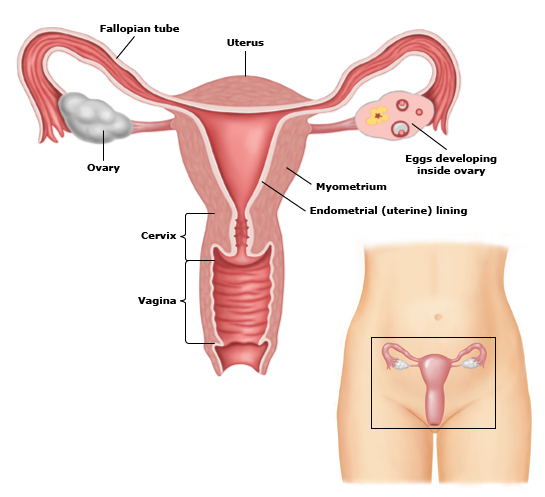Hysterectomy: The Basics
A hysterectomy is a surgical procedure meant to remove your uterus.
You would be surprised how many women do not know where the uterus is located or that removing it means that they can no longer have children or get periods.
There are four different ways of performing a hysterectomy:
- Vaginal Hysterectomy: the uterus is removed through a vaginal incision.
- Laparoscopic Hysterectomy: the uterus is removed via the aid of a tiny camera and small openings in your belly.
- Robotic Hysterectomy: similar to a laparoscopic hysterectomy except that the tools are attached to the DaVinci Robot which is then controlled by your surgeon.
- Abdominal Hysterectomy: the uterus is removed via a horizontal or vertical incision on your belly. This may need to be done if the uterus is too large to remove safely via a minimally invasive approach.
Why would I need a hysterectomy?
There are many reasons why a woman may need a hysterectomy. The most common are uncontrolled bleeding, large tumors (fibroids), herniation or prolapse of the uterus, cancer and severe pelvic pain due to endometriosis or adenomyosis.
Alternatives to hysterectomy:
Removing your uterus should be the last resort (unless you have cancer) because of the risks involved with surgery. If your issue is heavy bleeding, you can try hormonal options (birth control pills or progesterone), tranexamic acid (Lysteda), Progesterone containing IUDs, GnRH agonist (Lupron). Other surgical options like endometrial ablation, uterine artery embolization, or myomectomy (removal of the fibroid/s.
Pregnancy:
Many women need a hysterectomy but are concerned about child-bearing. You have options and each case is unique. Having a hysterectomy does not take away your ability to conceive. We just need to be a little more creative. Advanced reproductive technology now allows women to preserve their eggs and if need be have a child via a surrogate.
What other organs are removed during a hysterectomy?
Typically we recommend removing the cervix and fallopian tubes because both are attached to the uterus. In the past it was believed that preserving the cervix helped with sex and support however multiple studies have shown that this is not the case and that preserving the cervix only places you at risk for cervical cancer in the future. New studies have shown that the fallopian tubes should be removed to avoid a rare type of cancer that is found in the tubes.
Do my ovaries need to be removed?
Yes if you are in menopause. No if you are not in menopause or feel very strongly about preserving them. Ovaries make our hormones and our hormones are vital to prevent osteoporosis, Alzheimer’s, dementia, hot flashes, night sweats, mood swings, insomnia, weight gain….the list is endless. So if your ovaries are still functional…meaning you are not in menopause, you should try to preserve them. If you have gone through menopause, the recommendation is to remove them because of the risk of ovarian cancer and the fact that they are no longer functional.
Am I still going to be woman if I get my uterus taken out?
Absofuckenlutely!!! Please do not let anyone tell you otherwise. In fact, most women who need a hysterectomy have had such debilitating disease for so many years that once they have this procedure done they realize how amazing their life can be. You will be even more of a woman because you will now be able to enjoy all of the “womanly” things that you missed out on because your uterus got in the way. Almost 99.9% of my patients report such an improved quality of life that they are upset they didn’t do the surgery sooner. My advice is talk to your doctor. Each case is unique and they will help you figure out what is the best approach for you.